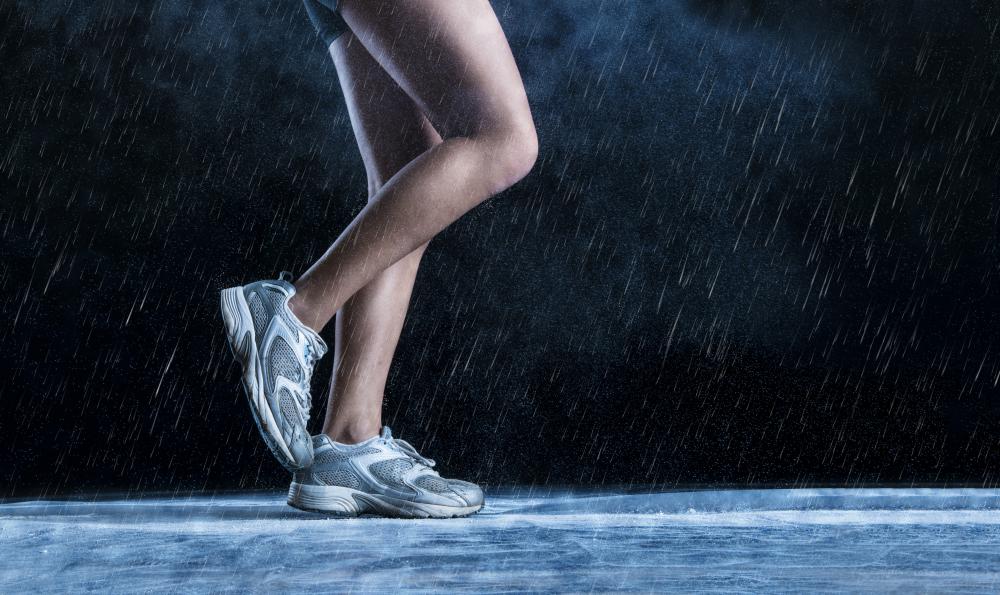At WiseGEEK, we're committed to delivering accurate, trustworthy information. Our expert-authored content is rigorously fact-checked and sourced from credible authorities. Discover how we uphold the highest standards in providing you with reliable knowledge.
What Are Leg Cramps?
Leg cramps are contractions of the leg muscle often causing a substantial amount of pain. There can be a number of different causes that are responsible for cramps. In many cases, they may be able to be prevented. However, some may be genetically prone to cramps and there may be little that can be done to stop them.
There are two prime times that cramps are more likely to happen. They can happen at night, while an individual is sleeping, causing them to wake up in excruciating pain. They can also happen during times of strenuous physical exercise. In the case of cramps during exercise, they may not be as severe, simply because steps can be taken if the person is awake to lessen the severity.

Though the exact cause of night leg cramps are not known, there are times when they seem to happen more often. Muscle overexertion the previous day, dehydration, pregnancy diabetes, certain medications and even the use of alcohol can mean a greater incidence of cramps. Night cramps often come upon an individual without warning, though some may be aware of some tightness in the muscle before the cramp begins in earnest.

Running leg cramps and swimming cramps often occur among athletes, especially those who have been engaged in such exercise for an extended period of time. In these situations, dehydration is often blamed as the main cause of the cramps. Athletes may be treated for the cramps by either taking in more fluids or perhaps even receiving intravenous fluids if the dehydration is severe enough.

Leg cramps are very easy to identify. Often occurring in the calf or the thigh, they cause intense pain usually lasting less than a minute, though it is possible for them to last several minutes. Putting pressure on the leg, either by standing on it, or pushing it against a solid object, may help alleviate the pressure. Stretching it can also lessen the severity.

Preventing leg cramps involves controlling the situations that are most likely to cause them. Staying hydrated tops is perhaps the most often recommended way to prevent a cramp. Stretching, getting enough potassium, and gradually increasing an exercise load are other common ways to prevent leg cramps.
In some cases, if night leg cramps are persistent, seeing a doctor is recommended. If a cause for the cramps can be determined, the doctor may be able to prescribe a medicine, lifestyle change or supplement that can help reduce the frequency and severity of the cramps. Though this may not prevent all cramps, any relief for those who suffer frequent leg cramps is welcomed.
AS FEATURED ON:
AS FEATURED ON:


















Discussion Comments
@croydon - I've had pretty bad leg cramps as an adult though and I'm still in my 30's. I've heard that they can be caused by a lack of certain minerals, but in my case they tend to happen when I overextend myself in general. So I usually get them after I've been at a concert festival or something all day and haven't had a chance to get off my feet.
@pleonasm - Sometimes it comes back to you as you get older though. My father gets severe leg cramps sometimes at night and has to walk around the house for an hour hoping that they will relax. If I'm visiting him I will give him a leg massage and that seems to help, but otherwise he just has to wait it out.
It happens in both of his legs so it's not related to an old injury or anything like that and it doesn't seem to matter where he sleeps or on what kind of mattress. I've suggested that he take a bath before bed and see if the hot water helps to relax his legs but he didn't think very much of that suggestion unfortunately. I don't think he's the kind of guy who takes baths.
I remember getting leg cramps a lot when I was a kid, especially when we were told to run for a long distance, although sprinting didn't seem to bother me.
But I've done quite a lot of running as an adult because I do the occasional race and I don't remember the last time I got a cramp. I guess you just grow out of them sometimes, or maybe your muscles build up to the point where they don't happen anymore.
Post your comments